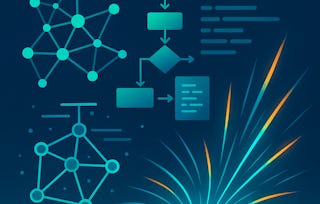Big data is the area of informatics focusing on datasets whose size is beyond the ability of typical database and other software tools to capture, store, analyze and manage. This course provides a rapid immersion into the area of big data and the technologies which have recently emerged to manage it.

Big Data Technologies

Big Data Technologies
Ce cours fait partie de plusieurs programmes.

Instructeur : Yousef Elmehdwi
Inclus avec
Expérience recommandée
Ce que vous apprendrez
Understanding and identifying use cases and domains of Big Data problems
Selecting and implementing technical solutions involving Big Data systems
Develop and use various open source software systems (Apache) in the Big Data tech stack
Operate and run various cloud computing software services (AWS) in the Big Data infrastructure space
Compétences que vous acquerrez
- Catégorie : Real Time Data
- Catégorie : Data Processing
- Catégorie : Data Ethics
- Catégorie : Data Management
- Catégorie : Data Infrastructure
- Catégorie : Apache Spark
- Catégorie : Data Lakes
- Catégorie : NoSQL
- Catégorie : Cloud Computing
- Catégorie : Apache Cassandra
- Catégorie : Apache Kafka
- Catégorie : MongoDB
- Catégorie : Software Design Patterns
- Catégorie : Apache Hive
- Catégorie : Distributed Computing
- Catégorie : Data Storage
- Catégorie : Big Data
- Catégorie : Apache Hadoop
- Catégorie : Informatics
- Catégorie : Databases
- Section Compétences masquée. Affichage de 13 compétence(s) sur 20.
Détails à connaître

Ajouter à votre profil LinkedIn
54 devoirs
Découvrez comment les employés des entreprises prestigieuses maîtrisent des compétences recherchées

Élaborez votre expertise du sujet
- Apprenez de nouveaux concepts auprès d'experts du secteur
- Acquérez une compréhension de base d'un sujet ou d'un outil
- Développez des compétences professionnelles avec des projets pratiques
- Obtenez un certificat professionnel partageable

Il y a 9 modules dans ce cours
Welcome to Big Data Technologies! In Module 1, students will develop a foundational understanding of analytic data, its inherent value, and the methods to transform raw data into valuable insights. This module covers the challenges of handling large datasets, including their collection, processing, and analysis, while providing a comprehensive overview of Big Data's origins, properties, and real-world applications. Additionally, students will explore the economic, logistical, and ethical concerns associated with Big Data, alongside the professional advantages for data scientists proficient in Big Data analysis.
Inclus
16 vidéos10 lectures8 devoirs1 sujet de discussion
Module 2 introduces students to the challenges of building and managing distributed systems for big data storage and processing. It covers Hadoop’s origins, concepts, core components, and key characteristics, while exploring the Hadoop ecosystem's tools and services. Students will gain an understanding of distributed file systems, specifically HDFS, YARN's resource management, and various technologies for effective big data storage and organization.
Inclus
13 vidéos7 lectures6 devoirs
In Module 3, students will explore the differences between processing small to moderate versus massive data volumes through distributed computing. This module covers the key concepts of the MapReduce framework, including how it breaks down large data processing tasks into smaller, parallel tasks for efficient execution. Students will also learn about the phases of MapReduce, the role of map and reduce functions, optimization patterns, and the benefits and limitations of various development approaches, including Java-based MapReduce and Hadoop Streaming.
Inclus
18 vidéos8 lectures7 devoirs
In Module 4, students will explore Apache Spark as a powerful distributed processing framework for interactive, batch, and streaming tasks. This module covers Spark's core functionalities, including machine learning, graph processing, and handling structured and unstructured data, while highlighting its in-memory processing potential and unified nature. Students will compare Spark with MapReduce, learn about Spark's primary components, execution architecture, Resilient Distributed Datasets (RDDs), DataFrames, Datasets, and the various methods for creating and optimizing DataFrames for efficient data processing.
Inclus
25 vidéos7 lectures6 devoirs
In Module 5, students will delve deeper into Spark's capabilities for data manipulation and transformation. The module covers essential operations such as selecting, filtering, and sorting data, as well as joining DataFrames and performing aggregations. Students will also learn about handling null values, using Spark SQL for data queries, and optimizing performance with caching. Practical applications include creating and manipulating DataFrames, executing transformations and actions, and efficiently writing data to various formats.
Inclus
19 vidéos11 lectures10 devoirs
Module 6 introduces students to the limitations of batch processing and the significance of real-time data processing. It covers essential aspects of stream processing, including data ingestion and analysis, with a focus on tools like Apache Kafka for stream ingestion and Spark Structured Streaming for scalable and fault-tolerant data processing. Students will also explore various design patterns for organizing big data clusters, the concept of data lakes, and the Lambda Architecture for unifying real-time and batch data processing in modern data environments.
Inclus
16 vidéos6 lectures6 devoirs
In Module 7, students will explore the benefits and limitations of relational databases in big data contexts and the concept of distributed database systems. This module covers NoSQL databases, their diverse data models, and their scalability and flexibility advantages. Students will also learn about real-world use cases, data partitioning, consistency models, and the CAP Theorem, gaining a comprehensive understanding of how NoSQL databases manage large datasets across clusters while ensuring scalability and availability.
Inclus
18 vidéos6 lectures6 devoirs
In Module 8, students will explore specific NoSQL databases types – namely Key-Value, Wide-Column, and Document databases. Two similar systems, HBase and Cassandra, will be studied and contrasted in the context of the CAP theorem and associated CP/AP trade-offs. Topics such as consistency and availability will be discussed in the context of specific usage scenarios for both HBase and Cassandra – and general application domains of both systems will be highlighted. Finally, the document database MongoDB will be reviewed in the context of natural language/text processing use cases – and MongoDB usage and architecture will be analyzed with respect to traditional RDBMS.
Inclus
9 vidéos4 lectures4 devoirs
This module contains the summative course assessment that has been designed to evaluate your understanding of the course material and assess your ability to apply the knowledge you have acquired throughout the course.
Inclus
1 devoir
Obtenez un certificat professionnel
Ajoutez ce titre à votre profil LinkedIn, à votre curriculum vitae ou à votre CV. Partagez-le sur les médias sociaux et dans votre évaluation des performances.
Préparer un diplôme
Ce site cours fait partie du (des) programme(s) diplômant(s) suivant(s) proposé(s) par Illinois Tech. Si vous êtes admis et que vous vous inscrivez, les cours que vous avez suivis peuvent compter pour l'apprentissage de votre diplôme et vos progrès peuvent être transférés avec vous.¹
Instructeur

Offert par
En savoir plus sur Software Development
 Statut : Prévisualisation
Statut : Prévisualisation Statut : Prévisualisation
Statut : PrévisualisationO.P. Jindal Global University
 Statut : Essai gratuit
Statut : Essai gratuitYonsei University
 Statut : Essai gratuit
Statut : Essai gratuitUniversity of Pittsburgh
Pour quelles raisons les étudiants sur Coursera nous choisissent-ils pour leur carrière ?

Felipe M.

Jennifer J.

Larry W.

Chaitanya A.

Ouvrez de nouvelles portes avec Coursera Plus
Accès illimité à 10,000+ cours de niveau international, projets pratiques et programmes de certification prêts à l'emploi - tous inclus dans votre abonnement.
Faites progresser votre carrière avec un diplôme en ligne
Obtenez un diplôme auprès d’universités de renommée mondiale - 100 % en ligne
Rejoignez plus de 3 400 entreprises mondiales qui ont choisi Coursera pour les affaires
Améliorez les compétences de vos employés pour exceller dans l’économie numérique
Foire Aux Questions
To access the course materials, assignments and to earn a Certificate, you will need to purchase the Certificate experience when you enroll in a course. You can try a Free Trial instead, or apply for Financial Aid. The course may offer 'Full Course, No Certificate' instead. This option lets you see all course materials, submit required assessments, and get a final grade. This also means that you will not be able to purchase a Certificate experience.
When you enroll in the course, you get access to all of the courses in the Specialization, and you earn a certificate when you complete the work. Your electronic Certificate will be added to your Accomplishments page - from there, you can print your Certificate or add it to your LinkedIn profile.
Yes. In select learning programs, you can apply for financial aid or a scholarship if you can’t afford the enrollment fee. If fin aid or scholarship is available for your learning program selection, you’ll find a link to apply on the description page.
Plus de questions
Aide financière disponible,

